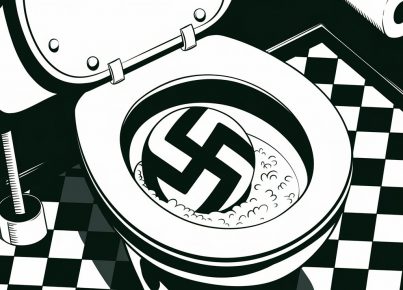What is fake news?
Fake news does not exist. Sure, there’s news stories that are about as trustworthy as a hooker’s evaluation of your dick size, but fake news wasn’t invented to help people identify such stories. Fake news was invented to help people cheat in political arguments and debates, and it does so by making slanderous and insulting accusations which can’t be answered in the time allotted. If you work in the media, you are being accused of being a liar, a phony, a manipulator and an all round scumbag. If you’re a regular dude, then they’re basically saying you’re as dumb as a bag of dildos, because you’re just sitting there consuming propaganda all day and don’t even realize it. Either way, please get this into your head right now; fake news is not a quirky postmodern term, it’s not a word to describe false news stories, it is a slur which doubles up as a very devious but powerful debating strategy. Today, I’m going to deconstruct the strategy and show you the sheer evil genius of it and afterwards you will see why Donald Trump is far far cleverer than you think. However, like everything Trump creates, it’s a house of cards, the fake news debating strategy is a con and today I’m going to blow the shit out of that con.
How does the fake news slur work?
Fake news is a devious debating strategy that allows you to accuse the other of peddling false information sources and therefore false opinions. And here is where the fake news strategy executes its crouching tiger, killer blow. After making that serious accusation of peddling fake news, the person doesn’t have a chance to defend themselves against it because the nature of debates is such that you can’t stop every 3 minutes when someone accuses you of fake news and start checking sources. So do you see what the con is: you are making accusations that you know they can’t defend themselves against and thus you achieve the ultimate objective of fake news; your opponent suffers the negative consequences of the stickler effect, which I will explain presently.
To see these consequences, lets imagine a politician and interviewer. After being accused multiple times of pedalling fake news the interviewer is suffering from multiple disadvantages. The fake news slur…
- Disrupts the interviewers flow.
- It turns the tables. Whereas traditionally the interviewer is supposed to be making the audience think about the credibility and sincerity of the politician, the accusation of fake news makes some in the audience think about the credibility and sincerity of the interviewer.
- It muddies the scoreboard. Some in the audience will think that because there was no comeback or proof to counter the accusation, that he’s somehow been bested.
- It makes the politician seem alpha. The interviewer has basically been accused of living in a fantasy world of fake news and the reporter just takes it like a complete gimp.
- It builds upon and reinforces an important lynchpin of the extremist political agenda: destroying people’s faith in the media.
Are there analogs or precedents to the fake news accusation?
The fake news debating strategy belongs to a family of arguments I call ‘stickling,’ it has a much longer name traditionally, imposing and excessive burden of proof, but if we’re trying to fix this f****** country we can’t be adopting terms like that we have to have things in one word. So I call it stickling.
What is stickling?
Stickling is where you demand that your opponent in an argument meet an excessively high standard of evidence – or demand proof of something that’s intrinsically or logistically impossible to prove. The stickling part comes when you fall into the trap and start to produce the evidence… because the the stickler will never be satisfied, which if you’ve ever tried to respond to the fake news accusation you will know. There’s basically no proof that the accuser will accept in order to verify your news story and they will fall back on increasingly absurd responses: for example, that the video you produce as evidence is a deep fake. That’s why fake news is such a dirty debating strategy.… they neither know nor care if your source is fake… they just want to inflict the stickler effect: which is the 5 negative consequences I outlined previously.
Stickling often occurs in moments of mob rule. For example: imagine you’re in the locker room at work and a mob of colleagues approach you, looking angry and ready to beat the shit out of you. You ask them what’s wrong and their leader, Big Donnie, huge fucker, union rep, arms like hams, says “There’s a rumor going round that you’re a fucking paedo.” And you shit yourself; even though you’re not a paedo, the situation makes you nervous, and you start sweating. Which of course leads to: “Look at him, he’s sweating. Nervous, are you? Fucking paedo.”
“I ain’t no fucking paedo.” you say… and Donnie says…
“Oh yeah… prove it.”
“Well I’m married, in I?”
“Fred West was married…and he was a fucking paedo.” “And a murderer,” someone adds from the back.
You hand over your mobile… “Well, look at my internet history… you won’t see any paedo stuff.”
Everyone laughs and you’re completely humiliated. “Pull the other one… it’s got bells on… you think I don’t know what incognitois? ”
“I don’t use it, donnie.. I swear… I ain’t no fucking paedo.”
At that moment, security arrives and breaks up the mob, and everyone walks off with the 5 negative consequences of the stickler effect. The most important of which is the vague that you’re guilty because you couldn’t disprove the accusation. Particularly seared in the memory of everyone present was how desperate and pathetic you seemed, handing over the mobile. “He was really clutching at straws there… fucking paedo.” And this shows the power of stickling, because you’re damned if you do and damned if you don’t. If you just dismiss the charge and refuse to answer the accusation… you look evasive, and if you try to answer the accusation then you’ll look even worse because you have fallen into the trap of trying to prove the unprovable. There is no way of proving you’re not a paedophile so everything you try to offer in your defence is doomed to fail and you look increasingly more desperate and guilty, and therefore, like a fucking paedo.
Fake news is a classic example of stickling and the stickler effect. Most people either ignore it – in which case they look bad, or try proving the veracity of the news source which as I said previously will never work and only lead to further humiliation: for example, when you produce government statistics or whatever, they’ll just mock you again: “ if you believe in that garbage then you’re even more of a muppet than I thought”. And the audience will laugh and he’s just scored another point.
Here’s the philosophical hard truth, and just before I tell you, remember that epistemology is the study of knowledge and what we can know etc. The hard truth is this: there is no epistemologically sound means of proving a story is definitively true, because of every level of proof you go to, there’s a counterproof available to the fake news accuser, which ultimately comes down to the fact that we can’t really say anything is true. How do I know that Trump and Biden in the entire political drama playing out, is not just a virtual reality movie that I’m watching in the future. Most of us, because we’re not engaging in the lowdown trickery to win an argument, agree on a criteria for what a true news story is, but it’s fundamentally an agreement and not a definitive guarantee of truth. What the fake news accuser has done is to opt out of that agreement and play the epistemological trump card, which is in a sense we can’t say anything is real or true.
The fact that they’ve opted out of what society normally considers as true and false, is also part of the con. They sit down for the debate without having told you this vital information, and it is vital, because it means that the argument is poisoned ab initio. it suffers from an inherent and intrinsic defect has already opted out of our conventions of logic reason and proof, and therefore no matter what you say you will never be able to convince them or win the argument. For you, it is a complete waste of time… fir them it is an opportunity to humiliate you, score points, parrot propaganda and basically have a jolly good time because they
That’s why the only way to deal with stickling is to address the behaviour of stickling., because if like a naive fool you enter into any of the debate trying to actually have a debate, you will end up suffering the stickler effect. The moment the fake news accusation is made you must stop the debate and ask them if they are willing to stop stickling, and if they’re not, you must terminate the debate, because stickling is an inherently anti-debating debating strategy.
But how is it possible that this one term – fake news – seemingly related to media, can allow someone to scupper all political arguments?
Basically – all political arguments ultimately come down to events or opinions you got from some form of media, which means that at any point in the debate I can ask you what information you’re basing your opinion on and then invalidate your opinion by claiming its source information is fake. Washington post – fake news, government statistics – fake news, world’s leading expert on a particular field – fake news. Fake news is a rhetorical tool that keeps on giving because all political argument is based on information.

But if it’s essentially a bad faith debating tactic, how does it have such power to poison debates and to confound even the most intelligent debaters and interviewers?
The problem is that false stories do exist: Fox news propagated the dominion voting system narrative, for example, AI can generate bogus content, and we all know that the mainstay of an authoritarian regime is its manipulation of the news. Therefore, the right to question sources is completely valid because fake news – in its original use – before it became a dirty debating strategy – exists.
But of course, although the accusation of fake news is a valid accusation, it unfortunately suffers from the problem we raised earlier:it’s both impossible to deal with in the time allotted for the debate and, in broader terms, if a person wants to be a stickler you can’t actually definitively refute the accusation.
This is the conceptual loophole which users of the fake news strategy are exploiting. Fake news is a valid accusation – especially in a country that values free speech – but it can be abused iby a bad faith debater.
How can I tell if someone is using the fake news accusation as a genuine questioning of sources or as an exploitation of the fake news loophole to shut me down?
What distinguishes a good faith use of the fake news accusation is that the source dispute can be cleared up quickly. If I’m talking about the recent GDP figures I read about in the financial times, you can claim that’s false, and then we check Wikipedia or the Economist or whatsoever and then we come to an agreement about the correct GDP figures. That is an example of a valid and good faith debating event where a source is disputed.
This is in stark contrast to a cynical exploitation of the fake news loophole where, Ii swear, even if you spent a decade confirming the source, they still wouldn’t agree it was true. So, that’s what distinguishes the good and bad faith use of fake news: the willingness to agree on rapid resolution methods for source disputes.
However, I’d say the main method you can employ to detect whether someone’s exploiting the loophole or not, is if they use the term fake news. Guys, if I can’t stress one thing enough it’s that you must not use this term, because you validate it. This is a typical liberal Muppet disaster, where feckless liberals start using the very terms which are undermining their own liberal democracy. Fake news must become bad etiquette and an immediate red flag that you’re debating with someone who isn’t actually interested in debating. Therefore I urge you to think of fake news as a fake concept. It’s a Janus word, Janus being the Roman two faced god: it looks like it’s a term of media, but it’s not: it’s a devious debating strategy that uses a despicable slur to cheat in political arguments. Therefore, the bad faith use of fake news is almost always announced by the linguistic use of ‘fake news’ in an accusatory voice.
But what about those millions of Americans who really do believe in the concept of the fake news media? Surely, there’s is a good faith use of the strategy because they genuinely believe in fake news.
Of course, whereas Donald Trump generally knows the truth when he’s pedaling his fake news strategy, millions of Americans actually really believe in the conspiracy of lies; so while I would agree that this is a good faith use of the fake news accusation, all that does is exonerate them in moral terms. But that’s no good to us as good faith debaters, because whether they’re using it genuinely or not, it still has the same ultimate effect on the debate. It blows everything up, shuts me down, and leads to the breakdown of dialogue. Therefore, while I agree that millions of citizens and family members may be using the fake news strategy in good faith, the overall destructive and polarising and paralysing effects of the strategy are the same.
And now I’d like to finish with a basic question that should summarise our conversation today?
Summary…
What is fake news? Fake news does not exist: it’s just a way of cheating in arguments by accusing the other of peddling false information, and therefore false opinions. Because it is logistically impossible to counter the accusation at that time, the accused now suffers the 5 negative consequences of the stickler effect.
Okay, thank you very much… please subscribe to my chanel, support me on Patreon etc. but most importantly… support your neighbour – even if he’s a fucking twat. And if you are going to try to tackle the fake news accusation, please remember to do so using the principles of hella. Humility empathy love laughter action. This country will only be fixed through love and understanding and rigorous organizing. Goodbye.
The only way we’re going to solve this is by being hella good




